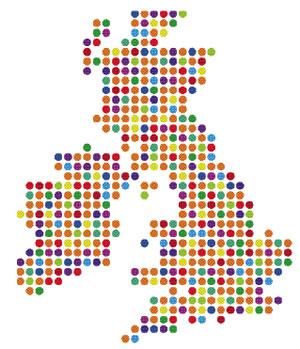Acquisition Nearly Doubles the U.K. Cooperative Footprint!

This July 14 the Co-operative Group in the United Kingdom purchased the Somerfield chain of 880 stores for approximately $3 billion dollars. Somerfield is the biggest acquisition in global consumer cooperative history.
Together, the new Co-operative Group will be an $18 billion food retailer with 8 percent market share and the most food stores of any British retailer. With its subsidiaries the Co-operative Group’s total annual turnover will be about $26 billion. It will have over 120,000 employees, making it the largest single co-op employer in the world.
Peter Marks, chief executive of the Co-operative Group said: “The acquisition of Somerfield will provide the rocket fuel for our three-year growth plan. There is a strong strategic fit between the two businesses. We anticipate real cost and revenue synergies, enabling us to enhance still further the overall value we deliver to our customers.”
Because of fair trade issues or market overlap, it is likely that over 100 Somerfield stores will be found to be surplus and sold off to other chains. The Co-operative Group merged in 2007 with United Co-operatives to form the largest British consumer co-op. Prior to the Somerfield acquisition, the Co-operative Group operated 2,200 food stores, served 15 million people weekly, and did about $10 billion annually in food retail. The Co-operative Group also operates the Co-operative Bank, CIS (Co-operative Insurance Society), Sunwin Motor distribution, the third largest chain of pharmacies, the largest independent travel agency, the largest funeral service. It is also Britain’s biggest farmer (90,000 acres) and runs many other enterprises. Counting the volume of all its enterprises, the Cooperative Group does $18 billion a year and has 2.5 million members.
There is much about this acquisition that speaks importantly to the economies of volume. The spreading of corporate costs and advertising over another 800 stores and the reduction of duplicative costs is a measurable business outcome. Scale cannot be downplayed in the United Kingdom, where two chains (TESCO and Asda) control 50 percent of all food retail and four chains control 76 percent.
What does this acquisition mean for cooperatives and cooperative values? The quick answer is: a lot!
- In the High Street, 800 stores will be rebranded under the new “co-operative” banner to become the largest community retailer in Britain linked to almost every locality.
- Ten million weekly Somerfield shoppers now become co-op customers and members, and approximately 40,000 Somerfield employees begin working for co-operative goals.
- Look at the cross-selling potential of the Co-operative Group’s many products to the ten million Somerfield shoppers. The Co-operative Group subsidiaries can do extensive additional business with minimal marginal cost.
- Watch the increased market penetration for the co-operative in some of its outstanding retail activities. The co-op will see a boost in sales of organics, local produce and products, and fair trade items and in its environmental and ethical initiatives. The added volume and visibility will enhance the co-operative’s “brand” and market leader position.
- In June of 2008, the Co-operative Group paid a dividend of $76 million dollars to members. Now millions of Somerfield shoppers can join the membership scheme. Co-operative members get dividends from all the different points of sale of the Co-operative Group’s subsidiaries, so the cross-selling potential is enormous.
- The Co-operative Group is the largest charitable donor by percentage, giving about 3 percent of profits to charity in Britain. This will mean about $30 million going to the nonprofit sector.
Finally, the merger will mean more dollars for development of the cooperative sector (see following recommendations).
Two “Cooperation Among Cooperatives” recommendations:
- Wherever required and economically feasible, the Co-operative Group should give a priority to sell or swap the surplus Somerfield stores, first to other existing consumer co-operatives and secondly to Waitrose, using the opportunity to get the John Lewis Partnership to join Co-operatives UK. Waitrose is the food retail arm of the John Lewis Partnership, Britain’s largest employee-owned cooperative. Each surplus Somerfield store is a one-time opportunity to strengthen other British cooperatives.
- Use this new national capacity to strengthen not just the Co-operative Group but the entire cooperative sector in Britain. Through this stronger, more powerful Co-operative Group, commit to creating a Co-operative Development Foundation to change the face and pace of cooperative development in Britain.
I had the great pleasure of meeting with Peter Marks in Rochdale in 2007. As CEO of United Co-operatives, Marks and his team were working with Martin Beaumont, the CEO of the Co-operative Group, to bring about a merger of the two co-op retail giants. With Beaumont retiring, it was natural that Marks would be chosen to lead the newly merged Co-operative Group. Marks and his team have now used their energy, initiative and proven merger management capacity to effect the acquisition of Somerfield. He is a dynamic co-op business leader with a commitment to run an efficient, profitable co-op business. His style and objective is to earn profits for the co-op’s business needs and turn the remaining operating surplus over to the board to choose where and how to carry out co-operative values.
For all of his efforts, let’s give Peter Marks the last word: “For The Co-operative Group this is a transformational deal, cementing our position as the United Kingdom’s premier community retailer and helping us significantly as we lead a renaissance of the cooperative brand.”
***
David J. Thompson is president of Twin Pines Cooperative Foundation, which operates the Cooperative Community Fund program (www.community.coop).







